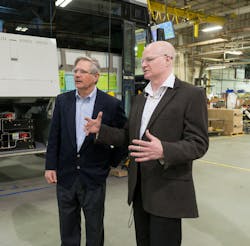State Senator Visits MCI Pembina, North Dakota Plant
Motor Coach Industries (MCI) announced U.S. Sen. John Hoeven, R-N.D., called the success of MCI’s Pembina, North Dakota manufacturing hub a thriving example of U.S. manufacturing leadership, crediting North Dakota’s “strong, pro-business environment” and MCI’s long history of “innovation and commitment to quality,”
While Hoeven toured the Pembina plant March 21, MCI officials thanked the senator for his hard work in passing the Fixing America’s Surface Transportation (FAST) Act last December — the first law in more than a decade to provide long-term funding certainty for surface transportation.
“MCI appreciates Senator Hoeven’s role in passing FAST Act,” said Patrick Scully, MCI executive vice president of sales and marketing. “When public transit has access to FAST Act funds to replace or add coaches, MCI is able to continue employing workers right here in Pembina, while supporting our local and nationwide supplier relationships.”
Opened in 1963, MCI’s Pembina plant is the current home to MCI’s D-Series models including its industry-leading Commuter Coach, seen in many public transit fleets. Sen. Hoeven, who was North Dakota’s governor from 2000 through 2010, is a long time advocate for public transit, secure infrastructure funding and improvements in public safety. During his tour, Hoeven viewed the manufacturing facility, met employees and was briefed on MCI’s Quality-at-Source (QAS) initiatives, which have led to improved production quality throughout MCI.
“Motor Coach Industries has provided good jobs for North Dakotans for many years and is a good example of successful manufacturing right here in the United States,” said Hoeven. “North Dakota’s strong pro-business environment, combined with the company’s innovation and commitment to quality, have helped MCI to grow and thrive.”
The FAST Act will help North Dakota move transportation projects forward with more than $250 million in funding throughout fiscal 2016 to improve road, bridge and other infrastructure projects, and other states.
As governor, Hoeven oversaw the creation and implementation of various programs aimed at improving infrastructure and transportation, including a 2001-2003 funding award to MCI used for employee training to elevate skill levels.
Production in Pembina is ramping up.
There are more than 200 workers at MCI’s Pembina plant, which is the company’s primary final assembly facility for MCI’s D-Series coach, the best-selling North American motor coach of all time and the company’s best-selling model in 2014 and 2015.
Work is speeding up. In February, MCI announced that NJ Transit exercised an option to add 332 Commuter Coaches to its fleet, following the transit agency’s July 2015 contract for 772 new Commuter Coaches. Together, the options increase NJ Transit’s MCI Commuter Coach purchase to 1,104 vehicles over the next six years.
In March, Denver Regional Transportation District extended its 2013 contract, choosing to add another 42 Commuter Coaches to its fleet. Denver RTD also purchased 59 coaches in 2015 for its Flatiron Flyer service between Denver and Boulder.
“We see motor coach transport as the future of public transit,” Scully said afterward. “As communities grow, road-based motor coach transportation is by far the most affordable, flexible and ecologically sensible option to carry citizens around the region and around the nation. We are most grateful to Senator Hoeven for seeing this trend early and supporting MCI in its creation of superior vehicles to serve communities and passengers throughout North America.”
